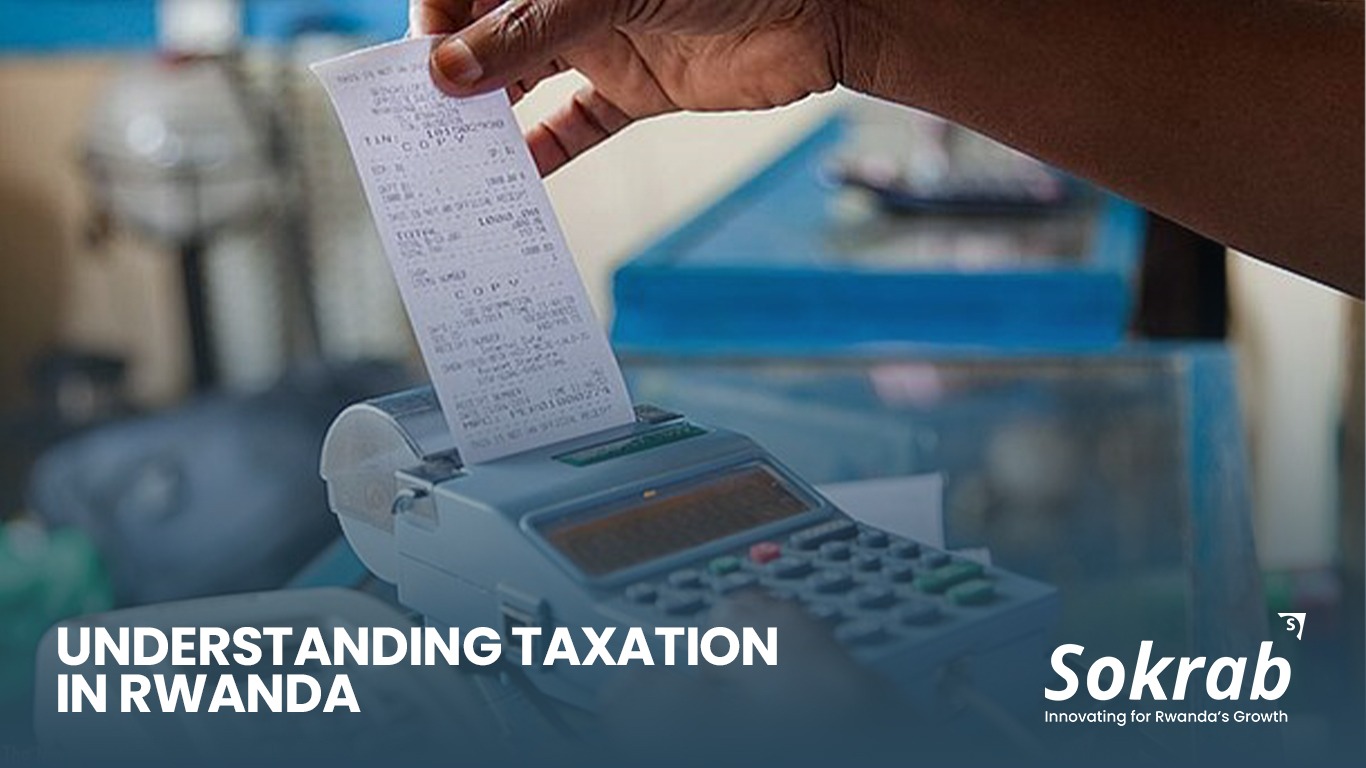Taxation in Rwanda: The Complete Guide to Taxes in Rwanda

Taxation in Rwanda plays a vital role in the country’s economic development, supporting infrastructure projects, public services, and the overall growth of the economy. Rwanda’s tax system is managed by the Rwanda Revenue Authority (RRA), ensuring transparency and fairness in tax collection
Understanding taxation in Rwanda is crucial for businesses and individuals alike, whether you are setting up a new business or expanding your operations. This guide provides a comprehensive overview of the various taxes in Rwanda, including corporate income tax, value-added tax (VAT), personal income tax, and other tax obligations, helping you navigate the tax landscape effectively.
Types of Taxation in Rwanda
1. Corporate Income Tax in Rwanda
One of the central components of taxation in Rwanda is the corporate income tax, which is levied on the profits of companies operating within the country. The standard corporate income tax rate in Rwanda is 30%, which applies to both domestic and foreign companies.
Tax Incentives and Exemptions
Newly Listed Companies:
Companies newly listed on the Rwanda Stock Exchange enjoy a 20% reduction in the corporate income tax rate for five years from the date of listing.
Export Businesses:
Enterprises that export goods and services benefit from a reduced corporate income tax rate of 15%.
Special Economic Zones (SEZs):
Businesses operating in SEZs may be eligible for tax holidays and reduced tax rates.
Filing and Payment Procedures
Corporate income tax in Rwanda returns must be filed annually. The tax year in Rwanda is the calendar year, and the deadline for filing returns is March 31st of the following year. Payments can be made in installments throughout the year.
Understanding these incentives can significantly impact your financial planning and business strategy, making it easier to thrive in Rwanda’s competitive market.
2. Value Added Tax (VAT) in Rwanda
What is VAT in Rwanda?
Value Added Tax (VAT) is another critical component of taxation in Rwanda, applied to the sale of goods and services. The standard VAT rate in Rwanda is 18%, which is relatively competitive in the East African region.
Exemptions and Reduced Rates
Certain essential goods and services in Rwanda are exempt from VAT or subject to reduced rates. These exemptions typically apply to basic foodstuffs, healthcare services, and educational services, which are considered essential for the well-being of the population.
Businesses in these sectors should be aware of the VAT exemptions to optimize their tax liabilities and ensure compliance with Rwandan tax laws.
Filing and Compliance
Businesses must file VAT returns monthly. The deadline for filing is the 15th day of the month following the taxable period. Accurate record-keeping and timely filing are essential to avoid penalties.
3. Personal Income Tax in Rwanda
Income Tax Rates and Brackets
Personal income tax in Rwanda is levied on the income of individuals based on a progressive tax system. The tax brackets in Rwanda are as follows:
- 0%: Up to RWF 30,000 per month
- 20%: RWF 30,001 to RWF 100,000 per month
- 30%: Above RWF 100,000 per month
Filing and Compliance
Individuals must file their income tax returns annually by March 31st of the following year. Employers are responsible for withholding and remitting taxes on behalf of their employees. Do not hesitate to reach us for Tax consultant in Rwanda.
4. Other Tax Obligations in Rwanda
4.1 Property Taxes
Property taxes in Rwanda are levied on the ownership of real estate, including land and buildings. These taxes are an essential part of the country’s revenue system and vary depending on the location and use of the property.
4.2 Customs Duties
Customs duties in Rwanda are imposed on goods imported into Rwanda. The rates vary depending on the type of goods and their country of origin.
4.3 Excise Taxes
Excise taxes in Rwanda are levied on specific goods such as alcohol, tobacco, luxury and fuel. These taxes are typically included in the price of the goods and can impact pricing strategies.
Navigating the Tax System in Rwanda
Business Registration and Tax Compliance
Before operating in Rwanda, you are suppose to do business registration with the Rwanda Development Board (RDB) and obtain a Tax Identification Number (TIN) from the Rwanda Revenue Authority (RRA). Proper registration and compliance with tax regulations are crucial for avoiding legal issues and optimizing tax liabilities.
Obtaining an Investment Certificate
Foreign investors interested in Rwanda can benefit from obtaining an investment certificate, which may grant additional tax incentives and exemptions. This certificate is particularly beneficial for businesses in key sectors like tourism, energy, and manufacturing.
Professional Advisory Services
Consulting with tax professionals and business advisors can help navigate Rwanda’s tax landscape, ensuring compliance and optimizing tax benefits. Stay in Touch for Tax consultant in Rwanda, contact us or Chat with us.
Tax Incentives for Investors in Rwanda
Special Economic Zones (SEZs)
Rwanda’s Special Economic Zones (SEZs) offer a favorable tax environment for businesses operating within designated areas. Companies in SEZs may benefit from reduced corporate tax rates, VAT exemptions, and other incentives designed to attract foreign investment.
Sector-Specific Incentives
Rwanda’s government provides tax incentives tailored to specific sectors such as ICT, agriculture, and renewable energy. Understanding these incentives can help investors make informed decisions and maximize their returns.
Compliance and Penalties
Common Compliance Requirements
Staying compliant with Rwanda’s tax laws involves regular filing of tax returns, accurate record-keeping, and timely payment of taxes. Non-compliance can result in penalties, fines, and interest charges that can impact your business operations.
Penalties for Non-Compliance
Rwanda imposes penalties for late filing, underreporting of income, and failure to pay taxes. These penalties are designed to enforce compliance and ensure that all taxpayers contribute their fair share.
Double Taxation Agreements (DTAs)
Overview of DTAs
Double Taxation Agreements (DTAs) between Rwanda and other countries prevent the double taxation of income earned in multiple jurisdictions. These agreements are vital for international businesses and investors to ensure they are not taxed twice on the same income.
Countries with DTAs with Rwanda
Rwanda has signed DTAs with several countries, allowing for more favorable tax treatment of income, particularly for businesses and individuals engaged in international activities. Some of the key countries that have DTAs with Rwanda include:
- South Africa: Facilitates trade and investment between Rwanda and South Africa by avoiding double taxation on income earned in both countries.
- Mauritius: Provides tax relief and promotes economic ties between Rwanda and Mauritius.
- Belgium: Encourages Belgian companies to invest in Rwanda by offering reduced tax rates on dividends, interest, and royalties.
- Singapore: Enhances economic cooperation between Rwanda and Singapore by ensuring that income is not taxed twice.
- Turkey: Promotes bilateral trade and investment by offering favorable tax treatment for income earned by residents of either country.
beware of this about Taxation in Rwanda
Taxation in Rwanda is a critical aspect of doing business, and understanding the various taxes in Rwanda is essential for compliance and financial planning. By leveraging the tax incentives, staying compliant with the tax laws, and utilizing resources like DTAs, businesses can optimize their operations and succeed in Rwanda’s growing economy.
For more information and expert guidance on navigating taxation in Rwanda, Just chat with our experts or contact Them to help you.
📞 Let's Connect!
Ready to unlock the potential of your business? Reach out to us. Your success story with Sokrab Ltd awaits!
Quick Links
Head Office
Office No. 504, Port Saeed, Al Wahda Building, PO Box 31367 Dubai, United Arab Emirates
Rwanda Office
Kigali, Kacyiru, 68 KG 684 st
Office Hours
Monday - Friday 09 AM - 05 PM
- info@sokrab.com
- +250793897842
